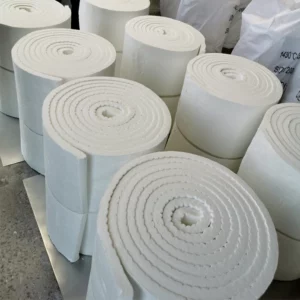Ceramic fiber tubes stand as a cornerstone in various industrial applications, revered for their resilience, thermal resistance, and adaptability across diverse settings. Composed of high-purity alumina-silicate ceramic fibers, these tubes offer exceptional thermal insulation and exhibit impressive mechanical strength, making them indispensable in environments subjected to extreme temperatures and harsh conditions. In this article, we’ll delve into the significance, characteristics, applications, and advantages of ceramic fiber tubes in industrial settings.
Significance of Ceramic Fiber Tubes
Exceptional Thermal Insulation:
Ceramic fiber tubes are renowned for their ability to withstand extreme temperatures while providing reliable thermal insulation.
Mechanical Strength:
These tubes possess robust mechanical properties, ensuring structural integrity even in challenging environments.
Characteristics and Benefits
High-Temperature Resistance:
The inherent properties of ceramic fibers enable these tubes to withstand temperatures exceeding 2300°F (1260°C) without compromising integrity.
Lightweight and Durability:
Despite their strength, ceramic fiber tubes remain lightweight, facilitating ease of handling and installation without sacrificing durability.
Applications and Versatility
Furnace and Kiln Linings:
Ceramic fiber tubes serve as crucial components in furnace linings, offering thermal insulation in high-temperature processes.
Insulation in Petrochemical Industry:
They are used in refineries and petrochemical plants for insulation in high-heat applications, such as reactor linings.
Aerospace and Automotive:
These tubes find applications in the aerospace and automotive sectors for thermal barriers and exhaust insulation.
Advantages and Considerations
Thermal Stability:
Ceramic fiber tubes maintain their structural integrity at extreme temperatures, ensuring consistent insulation performance.
Resistance to Chemicals:
Their resistance to most chemicals and corrosion contributes to their longevity in harsh industrial environments.
Ceramic fiber tubes serve as indispensable components in industries requiring reliable thermal insulation and mechanical strength. Their ability to withstand extreme temperatures, resist corrosion, and maintain structural integrity in harsh conditions makes them invaluable. When considering ceramic fiber tubes, prioritize their thermal resistance, mechanical strength, and chemical resistance to ensure suitability for specific industrial applications. By utilizing ceramic fiber tubes, industries can optimize safety, thermal efficiency, and the longevity of equipment and structures exposed to extreme temperatures. Remember, the significance of these tubes lies in their ability to provide robust thermal insulation, contributing to the efficiency and durability of industrial processes in demanding thermal environments.
